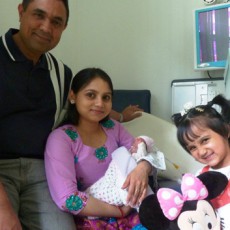- January 31st, 2013
- Author: Maria Mcleod
- Category: News

The Women’s Shine Project: Medaphor® Assessment in Specialist Training and its Economic Recompense Study (MASTERS) is one of 30 project teams from across the UK whose innovative idea to improve the quality of healthcare is being put to the test in 2013/14.
The innovations, selected for the Health Foundation’s Shine programme, are testing new approaches to delivering healthcare that will either support patients to be active partners in their own care, improve patient safety or improve quality while reducing costs.
 The Project Team, lead by Khaled Ismail, Professor of Obstetrics and Gynaecology at the Birmingham Women’s Hospital and the University of Birmingham, will aim to develop a new multi-professional Transvaginal Ultrasound (TVU) training curriculum based on virtual reality simulation. This will enable trainees to acquire the number of hours of hands-on practice they need to acquire skill in ultrasound away from a clinical setting without incurring high costs to supervising trusts.
The Project Team, lead by Khaled Ismail, Professor of Obstetrics and Gynaecology at the Birmingham Women’s Hospital and the University of Birmingham, will aim to develop a new multi-professional Transvaginal Ultrasound (TVU) training curriculum based on virtual reality simulation. This will enable trainees to acquire the number of hours of hands-on practice they need to acquire skill in ultrasound away from a clinical setting without incurring high costs to supervising trusts.
Professor Ismail explained, “Training in transvaginal ultrasound is traditionally carried out by supervised scanning on real patients. By using virtual reality simulation, trainees will still benefit from gaining the skills they need without causing any unnecessary embarrassment or discomfort to women. It is estimated that 252 more women could be scanned in the department each year for every trainee moving to the new curriculum that requires less real-life supervised training. The aim will be to increase the number of trained clinicians who can scan which will help to achieve a one-stop model of healthcare delivery in line with specialised services and other European countries.”
Dr Jane Jones, Assistant Director at the Health Foundation, said, ‘Innovative approaches are required to tackle the challenges that we are facing today in healthcare. We want to encourage innovators in the service to lead the way in thinking differently and to show how new approaches can deliver better healthcare.
‘This year we have chosen the 30 best innovative ideas, selected from a large number of applicants. The project teams will have the challenge of demonstrating the practicality of their ideas and show that they can improve quality and reduce costs with the potential to have high impact when scaled up across the UK. Our aim is to share and promote the most effective innovations to the clinical and managerial leaders of the UK healthcare system and policy-makers.’
This latest round of the Shine programme is the largest ever run by the Health Foundation. It has 30 project teams, selected from a high number of quality applications from across the health service.
Over 15 months, the teams will develop and test their approaches, put their ideas into practice and gather evidence about what works and what doesn’t. Each team will receive £75,000 of funding and a package of support from the Health Foundation.
By the end of 2014 the Health Foundation will have learnt about the different innovations, including those that have the potential to be spread more widely across the UK.










